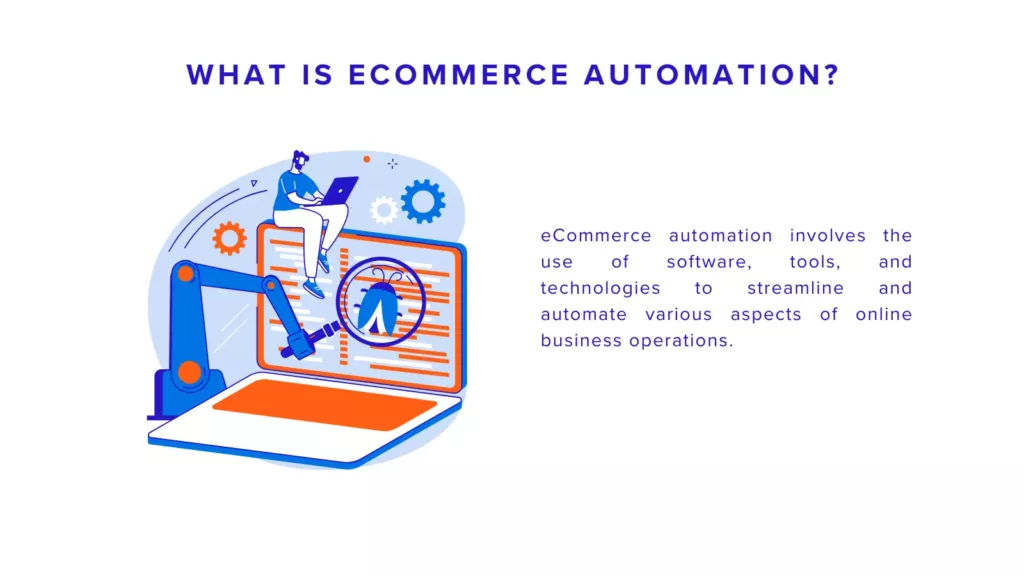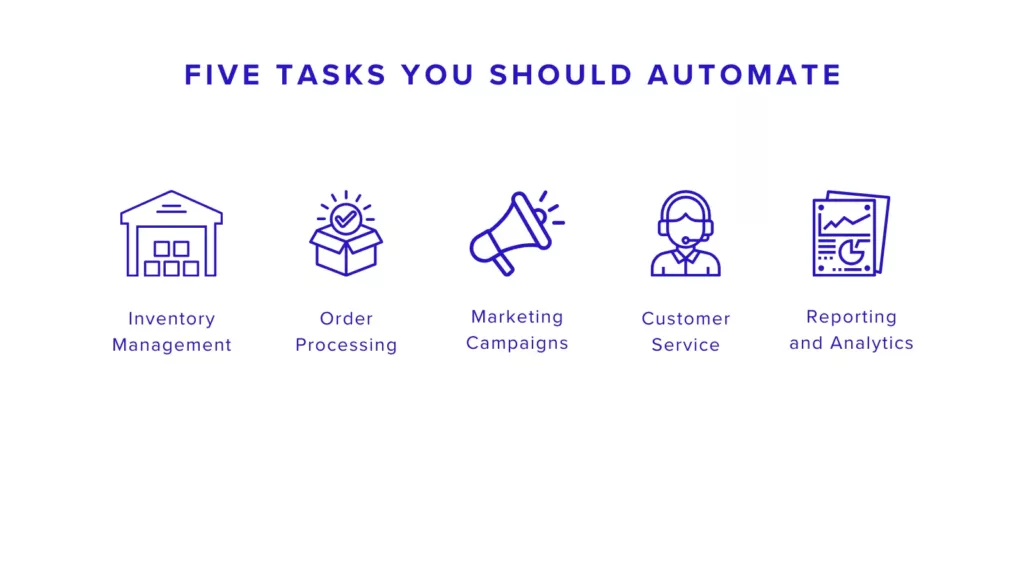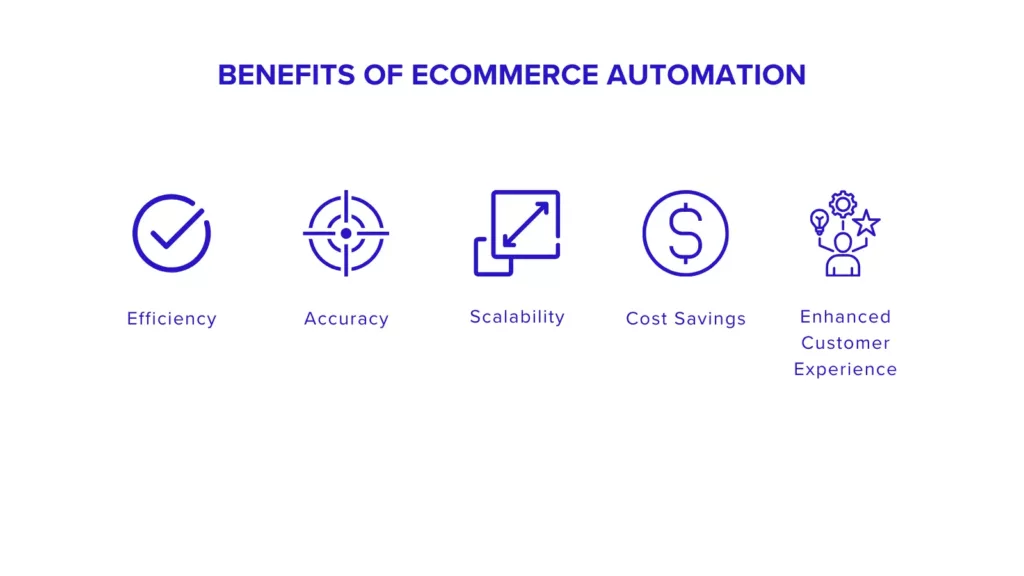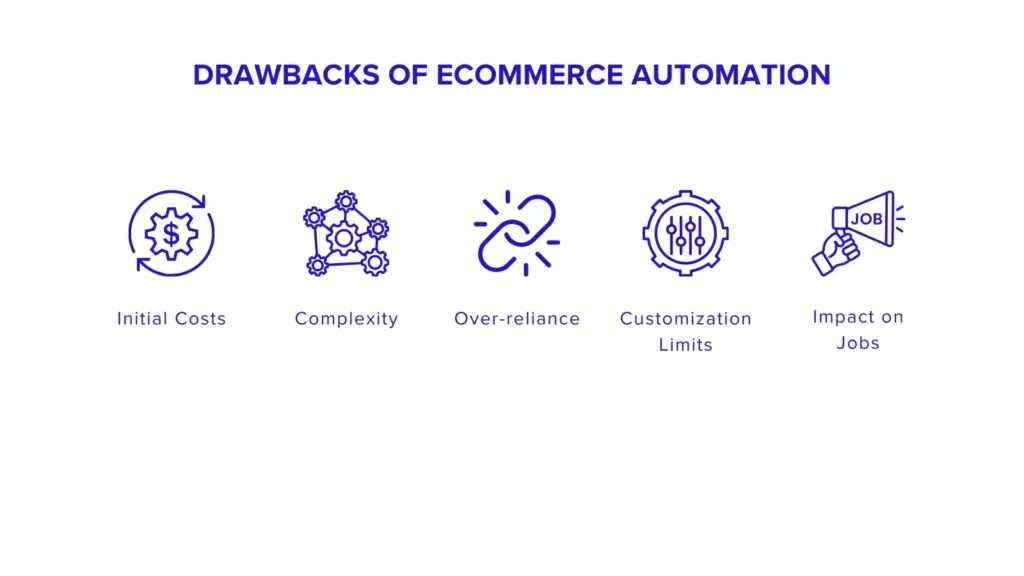It seems we can’t find what you’re looking for. Perhaps searching can help.
Sign Up for newsletter!
Subscribe to get the latest eBook!
Hotline







In today’s fast-paced digital world, eCommerce has become a crucial aspect of how businesses operate and grow. As global internet access and adoption rapidly increase, with over five billion internet users worldwide, the number of people making purchases online is ever-increasing. In 2024, retail eCommerce sales are estimated to exceed 6.3 trillion U.S. dollars worldwide, and this figure is expected to reach new heights in the coming years.
Knowing this, companies are constantly seeking ways to enhance efficiency, reduce errors, and provide a seamless customer experience. This is where eCommerce automation comes into play.
By leveraging advanced technologies and tools, businesses can automate repetitive tasks, streamline operations, and scale their efforts without the need for proportional increases in manual labor.
In this blog, we’ll dive into the concept of eCommerce automation, exploring its benefits and drawbacks to help you understand how it can transform your online business. Whether you’re a small startup or a large enterprise, understanding eCommerce automation can be a game-changer in optimizing your operations and staying competitive in the market.

At its core, eCommerce automation involves the use of software, tools, and technologies to streamline and automate various aspects of online business operations. This includes a wide range of tasks, from inventory management and order processing to marketing campaigns and customer service.
Essentially, eCommerce automation aims to reduce the need for manual intervention in repetitive and time-consuming processes, allowing you to operate more efficiently and effectively. By automating routine tasks, you can free up valuable time and resources, enabling them to focus on strategic initiatives, innovation, and providing exceptional customer experiences. Whether it’s automatically updating inventory levels, sending personalized marketing emails, or providing instant customer support through chatbots, eCommerce automation empowers your team to work smarter, not harder, in today’s digital marketplace.

There are numerous tasks ripe for automation, but here are five crucial ones: inventory management, order processing, marketing campaigns, customer service, and reporting/analytics.
Imagine you run an online store selling various products. Keeping track of inventory levels manually can be time-consuming and prone to errors. With automation, you can set up systems that automatically update your stock levels whenever a purchase is made or new stock arrives. Additionally, you can configure alerts to notify you when certain items are running low, prompting you to reorder them before they run out.
When a customer places an order on your website, there are several steps involved in processing and fulfilling that order. Automation can streamline this process by automatically routing orders to the appropriate fulfillment center or warehouse. It can also generate packing slips and shipping labels, ensuring that orders are processed quickly and accurately. With automated order tracking, both you and your customers can easily monitor the status of their orders from placement to delivery.
Marketing is essential for promoting your products and attracting customers to your online store. Automation can help you save time and reach a larger audience by automating email marketing campaigns and social media posts. You can set up automated email sequences to welcome new subscribers, nurture leads, and recover abandoned carts. Similarly, you can schedule social media posts in advance, ensuring consistent engagement with your audience across different platforms.
Providing excellent customer service is crucial for building trust and loyalty with your customers. However, managing customer inquiries and support tickets manually can be overwhelming, especially as your business grows. Automation can help lighten the load by using chatbots and automated response systems to handle common inquiries and support requests. These systems can provide instant responses to frequently asked questions, route complex queries to human agents, and even offer 24/7 support, improving the overall customer experience.
To make informed decisions and track the performance of your online store, you need access to accurate data and analytics. Manually collecting and analyzing data from various sources can be time-consuming and prone to errors. Automation can simplify this process by automatically collecting data from your website, sales platforms, and marketing channels. It can then generate customized reports and dashboards, providing valuable insights into your sales performance, customer behavior, and marketing ROI. With automated reporting and analytics, you can make data-driven decisions to optimize your eCommerce operations and drive business growth.
By automating these five key tasks, you can streamline your eCommerce operations, improve efficiency, and focus your time and resources on growing your business and providing exceptional customer experiences.

Adopting eCommerce automation can brings your business many benefits. Here are some of them
Automation streamlines your business processes by taking care of repetitive tasks, freeing up your time to focus on more strategic activities. Instead of manually updating inventory or processing orders, automation tools can handle these tasks quickly and efficiently, allowing you to operate more smoothly and effectively.
By reducing reliance on manual data entry and human intervention, eCommerce automation helps minimize the risk of errors. Whether it’s updating inventory levels or processing customer orders, automated systems can perform tasks with a high level of accuracy, ensuring that your business operations run smoothly and your customers receive the correct products on time.
As your eCommerce business grows, automation allows you to scale your operations without a proportional increase in workload. Whether you’re handling a handful of orders or thousands of transactions per day, automated systems can adapt to the increasing demands of your business, ensuring that you can meet customer needs efficiently and effectively.
While there may be initial investments required to implement automation tools and systems, the long-term cost savings can be significant. By streamlining your operations, reducing errors, and improving efficiency, eCommerce automation helps lower your overall operational costs, allowing you to allocate resources more effectively and invest in other areas of your business.
In today’s competitive eCommerce landscape, providing exceptional customer service is essential for building brand loyalty and driving repeat business. Automation plays a key role in enhancing the customer experience by providing quicker and more consistent service. Whether it’s responding to customer inquiries instantly with chatbots or delivering personalized marketing messages based on customer preferences, eCommerce automation helps create a seamless and enjoyable shopping experience for your customers, ultimately leading to higher satisfaction and loyalty.
By leveraging the benefits of eCommerce automation, you can streamline your operations, reduce costs, and deliver a superior customer experience, ultimately driving growth and success in the competitive online marketplace.

While eCommerce automation offers numerous benefits, there are also some drawbacks to consider.
Implementing eCommerce automation systems can incur significant upfront expenses. You may need to invest in software licenses, hardware infrastructure, and training for employees to effectively use these systems. For enterprises with limited financial resources, or don’t want to invest too much in this aspect, these initial costs can be a barrier to adoption.
Adopting eCommerce automation often involves navigating complex systems and technologies. You may encounter challenges in integrating automation tools with your existing workflows and processes. Additionally, employees may require time and training to familiarize themselves with the new systems, leading to potential productivity disruptions during the transition period.
While automation can enhance efficiency and streamline operations, your team risk becoming overly dependent on technology. Reliance on automated systems may leave you vulnerable to disruptions such as technical failures or system downtimes. Without proper contingency plans in place, these disruptions could significantly impact business operations and customer satisfaction.
Off-the-shelf automation solutions may not always fully align with the unique needs and requirements of every business. Customizing and tailoring automation tools to fit specific business processes can be challenging and time-consuming. You may find yourself constrained by the limitations of pre-built automation solutions, hindering your ability to fully optimize your eCommerce operations.
One of the most significant concerns surrounding eCommerce automation is its potential impact on employment. As your business automate repetitive and manual tasks, there is a risk of job displacement for workers whose roles are replaced by automated systems. This could lead to workforce reductions and require you to invest in reskilling and retraining programs for affected employees.
By understanding and addressing these drawbacks, you can make informed decisions about the extent to which you adopt eCommerce automation, mitigating potential challenges and maximizing the benefits of automation for your operations.

Background: Amazon, founded by Jeff Bezos in 1994, has evolved from an online bookstore to one of the world’s largest eCommerce platforms. With a vast array of products and a global customer base, Amazon’s success lies in its ability to innovate and optimize its operations continuously.
Automation Implemented: Amazon has heavily invested in automation across various aspects of its eCommerce operations.
Results: Amazon’s automation efforts have yielded several significant benefits:
Background: Sephora is a leading global beauty retailer known for its wide range of cosmetics, skincare, and fragrance products. With a strong presence both in physical stores and online, Sephora has built a reputation for offering high-quality products and exceptional customer service.
Automation Implemented: Sephora has leveraged automation to enhance its personalized marketing efforts, catering to the unique preferences of individual customers.
Results: Sephora’s automation efforts have yielded several positive outcomes:
Final Words
eCommerce automation offers significant benefits like increased efficiency and enhanced customer satisfaction, but it also poses challenges such as initial costs and job displacement. However, by carefully implementing automation tools and strategies, businesses can streamline operations and drive growth. Case studies of companies like Amazon and Sephora demonstrate the transformative impact of automation on eCommerce success.
Ready to take your eCommerce empire to the next level? Contact SECOMM today!
 2
2
 2,496
2,496
 0
0
 1
1Subscribe to get the latest eBook!
Hotline